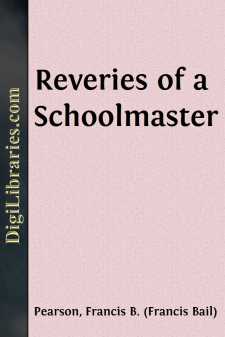Education Books
Sort by:
by:
Ellen Key
THE EDUCATION OF THE CHILD Goethe showed long ago in his Werther a clear understanding of the significance of individualistic and psychological training, an appreciation which will mark the century of the child. In this work he shows how the future power of will lies hidden in the characteristics of the child, and how along with every fault of the child an uncorrupted germ capable of producing good is...
more...
by:
Various
INTRODUCTION In times of anxiety and discontent, when discontent has engendered the belief that great and widespread economic and social changes are needed, there is a risk that men or States may act hastily, rushing to new schemes which seem promising chiefly because they are new, catching at expedients that have a superficial air of practicality, and forgetting the general theory upon which practical...
more...
IDEALS. A noble aim,Faithfully kept, is as a noble deed.Wordsworth. To few men does life bring a brighter day than that which places the crown upon their scholastic labors, and bids them go forth from the halls of the Alma Mater to the great world's battlefield. There is a freshness in these early triumphs which, like the bloom and fragrance of the flower, is quickly lost, never to be found again...
more...
by:
Maria Edgeworth
PREFACE. We shall not imitate the invidious example of some authors, who think it necessary to destroy the edifices of others, in order to clear the way for their own. We have no peculiar system to support, and, consequently, we have no temptation to attack the theories of others; and we have chosen the title of Practical Education, to point out that we rely entirely upon practice and experience. To...
more...
Words and terms have, to different minds, various significations; and we often find definitions changing in the progress of events. Bailey says learning is "skill in languages or sciences." To this, Walker adds what he calls "literature," and "skill in anything, good or bad." Dr. Webster enlarges the meaning of the word still more, and says, "Learning is the knowledge of...
more...
by:
Maria Montessori
A SURVEY OF THE CHILD'S LIFE The general laws which govern the child's psychical health have their parallel in those of its physical health.—Many persons who have asked me to continue my methods of education for very young children on lines that would make them suitable for those over seven years of age, have expressed a doubt whether this would be possible. The difficulties they put...
more...
CHAPTER I INTRODUCTION—THE PRESENT UNREST IN EDUCATION The problems as to the end or ends at which our educational agencies should aim in the training and instruction of the children of the nation, and of the right methods of attaining these ends once they have been definitely and clearly recognised, are at the present day receiving greater and greater attention not only from professed...
more...
Gentlemen of the Canadian Club:—Your president has asked me to address you this afternoon in the English language. It is with great pleasure that I received this invitation and that I avail myself of the privilege of speaking to you in that language with regard to the very troublesome, somewhat distorted, and certainly much misrepresented school question in your sister province. First of all, I wish...
more...
THE POINT OF VIEW There is an endless, and perhaps worldwide, controversy as to what constitutes the "essentials" of education; and as to the steps to be taken in the teaching of these essentials. The safe plan for constructive workers appears to be to avoid personal educational philosophies and to read all the essentials of education within the needs and processes of the community itself....
more...
CHAPTER I IN MEDIAS RES I am rather glad now that I took a little dip (one could scarce call it a baptism) into the Latin, and especially into Horace, for that good soul gave me the expression in medias res. That is a forceful expression, right to the heart of things, and applies equally well to the writing of a composition or the eating of a watermelon. Those who have crossed the Channel, from...
more...











